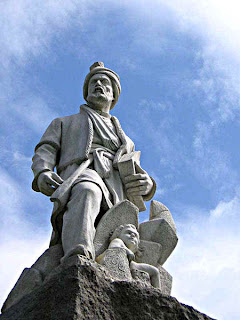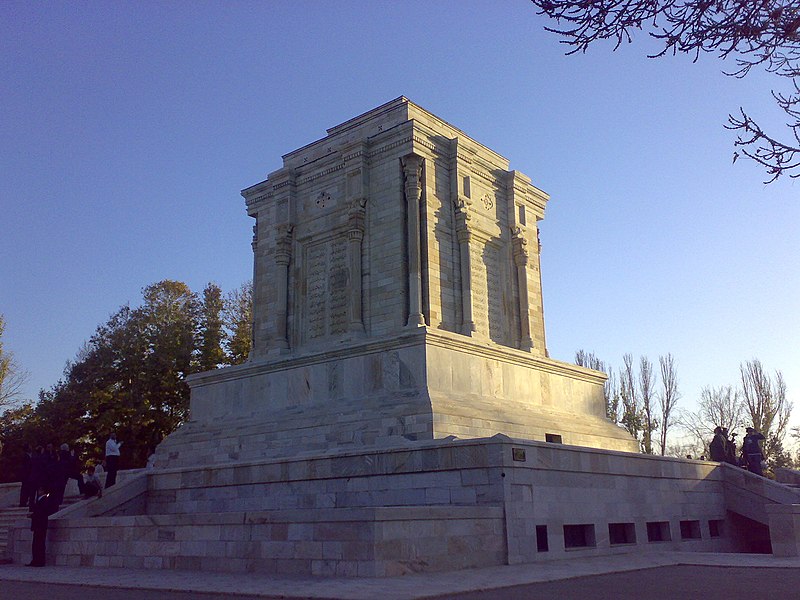Ferdowsi Commemoration Day

Today, May 14 (25 Ordibehesht) is Ferdowsi Commemoration Day in Iran.
Who is Ferdowsi?
Hakīm Abol-Qāsem Ferdowsī Tūsī (Persian: حکیم ابوالقاسم فردوسی توسی) or simply known as Ferdowsi, (935–1020) was a highly revered Persian poet who authored Shāhnāmeh (The Book of Kings) , a masterpiece and the national epic of Persian-speaking world as well as the entire Iranian realm.
Shahnameh
The Shāhnāmeh tells the mythical and historical past of Iran, beginning with the creation of the world and the introduction of the arts of civilization (fire, cooking, metallurgy, law) to the Aryans and ends with the sad Arab conquest of Persia. Also reflected in Shahnameh are Iran's cultural values, its ancient religions (Zoroastrianism) and its profound sense of nationhood no wonder this voluminous work is regarded by Persian speakers as a literary masterpiece.
Aside from its literary importance the Shâhnameh, written in almost pure Persian, has been pivotal for reviving the Persian language subsequent to the influence of arabic. Ferdowsi started his composition of the Shahnameh in the Samanid era in 977 A.D and completed it around 1010 A.D. during the Ghaznavid era. then Ferdowsi went to Ghazni, the Ghaznavid capital, to present it to the king. There are various stories in medieval texts describing the lack of interest shown by the new king, Sultan Mahmud of Ghazni, in Ferdowsi and his lifework. According to historians, Mahmud had promised Ferdowsi a dinar for every distich written in the Shahnameh (60,000 dinars), but later retracted and presented him with dirhams (20,000 dirhams), which were at that time much less valuable than dinars (every 100 dirhams worth 1 dinar). Some think it was the jealousy of other poets working at the king’s court that led to this treachery; the incident encouraged Ferdowsi's enemies in the court. Ferdowsi rejected the money and, by some accounts, he gave it to a poor man who sold wine. Wandering for a time in Sistan and Mazandaran, he eventually returned to Tus, heartbroken and enraged.
Ferdowsi started his composition of the Shahnameh in the Samanid era in 977 A.D and completed it around 1010 A.D. during the Ghaznavid era. then Ferdowsi went to Ghazni, the Ghaznavid capital, to present it to the king. There are various stories in medieval texts describing the lack of interest shown by the new king, Sultan Mahmud of Ghazni, in Ferdowsi and his lifework. According to historians, Mahmud had promised Ferdowsi a dinar for every distich written in the Shahnameh (60,000 dinars), but later retracted and presented him with dirhams (20,000 dirhams), which were at that time much less valuable than dinars (every 100 dirhams worth 1 dinar). Some think it was the jealousy of other poets working at the king’s court that led to this treachery; the incident encouraged Ferdowsi's enemies in the court. Ferdowsi rejected the money and, by some accounts, he gave it to a poor man who sold wine. Wandering for a time in Sistan and Mazandaran, he eventually returned to Tus, heartbroken and enraged.
Ferdowsi is said to have died around 1020 in poverty at the age of 90, embittered by royal neglect, though fully confident of his work’s ultimate success and fame.
"Buildings of the city suffer deterioration
From the raindrop and the ray of sunlight."
"I founded a great palace of verse [The Shahnameh]
That is impervious to the wind and the rain"
"I shall not die, these seeds [of discourse] I've sown will save
My name and reputation from the grave,"
"And men of sense and wisdom will proclaim,
When I have gone, my praises and my fame."
One tradition claims Mahmud re-sent the amount promised to Ferdowsi’s village, but when the messengers reached his house, he had died a few hours earlier. The gift was then given to his daughter, since his son had died before his father at the age of 37. However, his daughter refused to receive the sum, thus making Ferdowsi’s Shahnameh immortal.
for more information please refer to Ferdowsi and Shahnameh articles on Wikipedia.
Wednesday, May 14, 2008
|
Labels:
Ancient Persia,
Persian Poets and Scholars
|
This entry was posted on Wednesday, May 14, 2008
and is filed under
Ancient Persia
,
Persian Poets and Scholars
.
You can follow any responses to this entry through
the RSS 2.0 feed.
You can leave a response,
or trackback from your own site.


0 comments:
Post a Comment